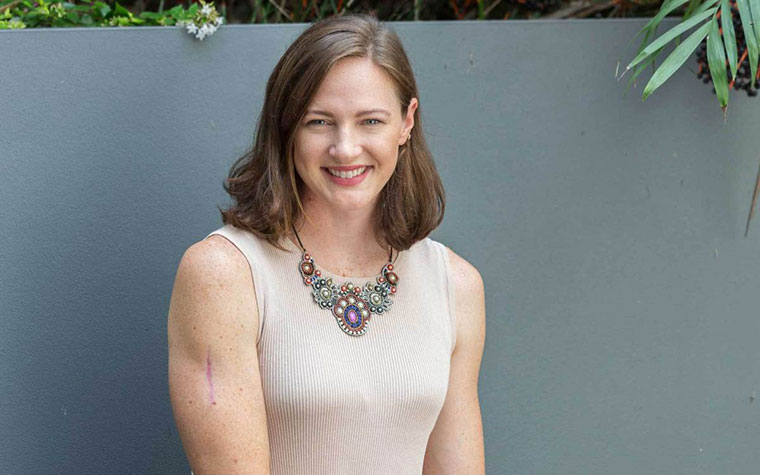World record holder, Olympian and Australian swimming champion Cate Campbell has been announced as National Ambassador for Melanoma Institute Australia (MIA). Cate is also supporting Melanoma March and will be attending the Brisbane twilight March at Riverstage on Sunday, 24 March.
Cate joined MIA Co-Medical Directors, Professor Georgina Long and Professor Richard Scolyer, and CEO Matthew Browne on a tour of Melanoma Institute Australia in Sydney to announce her role as ambassador. Cate also met young mum Jenny Day and her three little girls who lost their dad and husband David to melanoma. They are one of four families bravely sharing their stories of loss for the 2019 Melanoma March campaign.
“I will be joining the Melanoma March event in my home town of Brisbane as I know I was incredibly lucky, but for so many people diagnosed with melanoma this isn’t the case,” Cate said.
“We need to keep encouraging Australians to prioritise sun safety and skin awareness as part of their health regime, and we need answers. To find those answers we need research, and that means raising much-needed research dollars through campaigns like Melanoma March.
Please join me in helping those Australians bravely battling for their lives, and supporting families like David Day’s who are left behind.”
Melanoma Institute Australia CEO Matthew Browne says the organisation is delighted to have Cate Campbell on board as the 26-year-old athlete’s own recent brush with melanoma compellingly demonstrates the importance of being sun-safe and aware of changes to your skin.
“Cate embodies the Australian way of life and her love of the outdoors, be it swimming, hiking or kayaking, makes her an ideal National Ambassador for MIA,” Matthew said. “Many people don’t realise melanoma kills one Australian every five hours and is the most common cancer affecting 15 to 39 year olds. By having Cate on board we will better be able to reach young Australians with sun-safety and skin awareness messages.”
Cate went for a skin check in November 2018 after bumping into a friend who had a near miss with melanoma. Cate had a mole on her arm removed during the check, which turned out to be Stage I melanoma and required further surgery. It was her melanoma diagnosis that inspired her to become an advocate for the importance of sun safety and skin checks.
“As Australians, we spend so much time in the sun and with melanoma the most common cancer in young Australians I want to make sure people know the importance of having skin checks,” said Cate. “As someone with pale, freckly skin, keeping up with freckles and sun spots is difficult, but my melanoma developed in a mole I had my whole life and on the surface it looked like nothing had changed. I shudder to think what would have happened had I not had that mole checked. It literally saved my life.”
Melanoma Institute Australia is leading global research efforts to find a cure for melanoma. Despite recent breakthroughs tripling life expectancy for many advanced melanoma patients, more research is needed into why some people just don’t respond, and also to determine how to tackle earlier stage disease.
“To reach zero deaths from melanoma, we need to crack the riddle of so-called ‘super progressors’, like David Day, whose disease progresses rapidly despite these new treatments and they die within months” said Professor Georgina Long. “We also need to better understand how we can use these new treatments during earlier stage melanoma, to stop it spreading to vital organs in the first place,” added Professor Scolyer.
Take steps to end melanoma – and join Cate in the March toward a cure.
February 28, 2019
Swimming champion Cate Campbell to March for a cure



